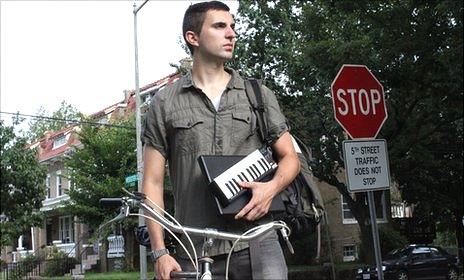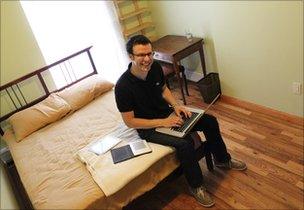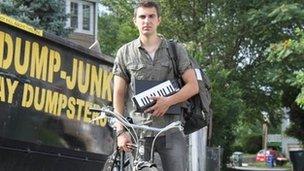Cult of less: Living out of a hard drive
- Published

Chris Yurista, a Washington, DC resident who lives out of a backpack, claims digital technology has replaced the need for his home and his possessions
Many have begun trading in CD, DVD, and book collections for digital music, movies, and e-books. But this trend in digital technology is now influencing some to get rid of nearly all of their physical possessions - from photographs to furniture to homes altogether.
Let's face it - digital files, applications and web services are replacing the need for many of the physical goods that pepper our homes, crowd our desks and fill our closets.
From online photo albums to virtual filing cabinets to digital musical instruments, hi-tech replacements are becoming ubiquitous.
But as goods continue to make the leap from the bookshelf to the hard drive, some individuals are taking the opportunity to radically change their lifestyles.
'21st Century minimalist'
Meet Kelly Sutton, a spiky-haired 22-year-old software engineer with thick-rimmed glasses and an empty apartment in Brooklyn's Williamsburg neighbourhood - a hotbed for New York's young, early adopters of new technology.
Mr Sutton is the founder of CultofLess.com, a website which has helped him sell or give away his possessions - apart from his laptop, an iPad, an Amazon Kindle, two external hard drives, a "few" articles of clothing and bed sheets for a mattress that was left in his newly rented apartment.
This 21st Century minimalist says he got rid of much of his clutter because he felt the ever-increasing number of available digital goods have provided adequate replacements for his former physical possessions.
"I think cutting down on physical commodities in general might be a trend of my generation - cutting down on physical commodities that can be replaced by digital counterparts will be a fact," said Mr Sutton.

Mr Sutton sold or gave away most of his assets, apart from his iPad, Kindle, laptop and a few other items
The tech-savvy Los Angeles "transplant" credits his external hard drives and online services like iTunes, Hulu, Flickr, Facebook, Skype and Google Maps for allowing him to lead a minimalist life.
"I think the shift to all digital formats in all methods and forms of media consumption is inevitable and coming very quickly," said Mr Sutton.
And Mr Sutton may be right.
Consumer electronic book sales tripled between 2008 and 2009, while the growth of physical book sales slowed, according to the Association of American Publishers.
Meanwhile, compact disc sales have declined by roughly 50% from their 2005 levels worldwide, while global revenue from digital music has nearly quadrupled in the same period, according to the International Federation of the Phonographic Industry.
Virtual homelessness
Chris Yurista, a DJ from Washington, DC, cites this trend in digital music as one reason he was able to hand over the keys to his basement apartment over a year ago.
"It's always nice to have a personal sense of home, but that aside - the internet has replaced my need for an address," the 27-year-old said.
Since boxing up his physical possessions and getting rid of his home, Mr Yurista has taken to the streets with a backpack full of designer clothing, a laptop, an external hard drive, a small piano keyboard and a bicycle - an armful of goods that totals over $3,000 (£1,890) in value.
The American University graduate, who spends much of his time basking in the glow emanating from his Macbook, earns a significant income at his full-time job as a travel agent and believes his new life on the digital grid is less cluttered than his old life on the physical one.
"I don't feel a void living the way I'm living because I've figured out a way to use digital technology to my advantage," Mr Yurista explained.
Mr Yurista feels by digitising his life, he no longer has to worry about dusting, organising and cleaning his possessions. And he says his new intangible goods can continue to live on indefinitely with little maintenance.
"Things like records snap and wear down over time. It's upsetting. MP3s don't," he said.

Mr Yurista feels his digital possessions can now live on indefinitely with little maintenance
The DJ has now replaced his bed with friends' couches, paper bills with online banking, and a record collection containing nearly 2,000 albums with an external hard drive with DJ software and nearly 13,000 MP3s.
But Mr Yurista is not the only digital vagabond.
Joshua Klein, a New York City-based technology innovation consultant, also set out on the road with his hard drive.
He and his wife digitised their possessions, got rid of two-thirds of what they owned and headed to the streets of New York for nine months with their laptops.
But Mr Klein and Mr Yurista both admit there are risks involved.
Mr Klein says the lifestyle can become loathsome because "you never know where you will sleep". And Mr Yurista says he frequently worries he may lose his new digital life to a hard drive crash or downed server.
"You have to really make sure you have back-ups of your digital goods everywhere," he said.
Data crisis counsellor
Data recovery engineer Chris Bross agrees and says if individuals backed up their digital lives "they wouldn't need us when a failure occurs, and they wouldn't be in crisis".
As digital possessions shrink the need for physical property, data recovery companies like DriveSavers, DTI Recovery and Eco Data Recovery may become the emergency response teams of the future.
Mr Bross, a DriveSavers employee, believes as individuals grow increasingly dependent on "digital storage technology for holding all these assets that they used to hold more tangibly", data recovery services will become rather like the firefighters of the 21st Century - responders who save your valuables.
And like a house fire that rips through a family's prized possessions, when someone loses their digital goods to a computer crash, they can be devastated.
Kelly Chessen, a 36-year-old former suicide hotline counsellor with a soothing voice and reassuring personality, is DriveSavers' official "data crisis counsellor".
Part-psychiatrist and part-tech enthusiast, Ms Chessen's role is to try to calm people down when they lose their digital possessions to failed drives.
Ms Chessen says some people have gone as far as to threaten suicide over their lost digital possessions and data.
"It's usually indirect threats like, 'I'm not sure what I'm going to do if I can't get the data back,' but sometimes it will be a direct threat such as, 'I may just have to end it if I can't get to the information'," said Ms Chessen.
And Ms Chessen says she is receiving an increasing number of calls as the shelf life of our physical possessions draws to a close.
The 'ultimate replacement'
Research Fellow Anders Sandberg, at the Future of Humanity Institute at Oxford University, warns Ms Chessen may soon be dealing with larger problems than lost photos and video footage.
He says our hard drives may one day contain the most important digital replacement of all - digitised replicas of our own brains.
Dr Sandberg believes we could be living on hard drives along with our digital possessions in the not too distant future, which would allow us to shed the trouble of owning a body.
The concept is called "mind uploading", and it suggests that when our bodies age and begin to fail like a worn or snapped record, we may be able to continue living consciously inside a computer as our own virtual substitutes.
"It's the idea that we can copy or transfer the information inside the brain into a form that can be run on the computer," said Dr Sandberg.
He added: "That would mean that your consciousness or a combination of that would continue in the computer."
Dr Sandberg says although it's just a theory now, researchers and engineers are working on super computers that could one day handle a map of all the networks of neurons and synapses in our brains - and that map could produce human consciousness outside of the body.
He says if a complete map of our brains was uploaded to a computer and a conscious, digital replica of ourselves was created, we could, in theory, continue to live forever on a hard drive along with our MP3s and e-books.
When asked, Mr Yurista says mind uploading sounds like a very hard concept to grasp but admits getting rid of one's body and living inside a computer "truly sounds like the ultimate form of minimalism".